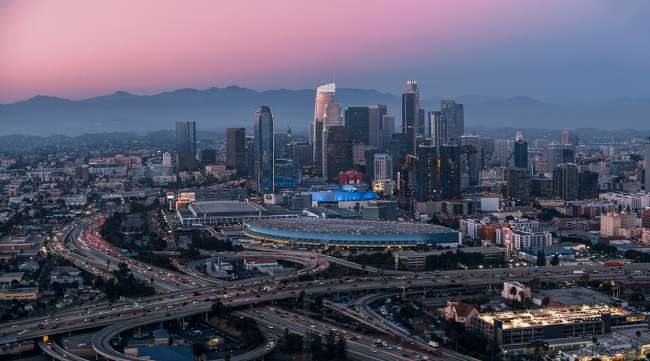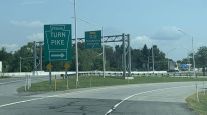Staff Reporter
Los Angeles Feasibility Study Will Look at Congestion Pricing

[Stay on top of transportation news: Get TTNews in your inbox.]
Los Angeles has joined the metropolitan areas that are exploring congestion pricing systems.
The board of directors for the Los Angeles County Metropolitan Transportation Authority (Metro) has approved two contracts totaling some $5.5 million to conduct a feasibility study evaluating the possibility of congestion pricing in the area.
Metro spokesman Dave Sotero said the study, scheduled to last between 18 and 24 months, would examine potential scenarios and help identify areas that may be suitable for a pilot program.

Sotero
“The L.A. region is extremely congested,” Sotero told Transport Topics. “As Metro, we have the responsibility to explore initiatives that can help provide high quality options so people will spend less time traveling. That’s really our responsibility as the region’s transportation planner.”
Metro awarded a contract for $3 million to WSP USA to assist with the study’s technical services, such as investigating the framework for pricing strategies, assessing pricing models and selecting a potential location for the pilot program. Sotero noted the pilot program wouldn’t stretch “carte blanche” throughout the county, but would likely apply to certain areas where congestion is especially bad.
The second contract, for $1.9 million with a $589,000 extension option, was awarded to the consulting firm Guidehouse to engage the public throughout the feasibility study. The contractor will reach out to industry representatives, community organizations and other members of the public to make sure they are involved in the process.
Sotero explained the purpose of congestion pricing would be multipronged. The system is meant to create a speedier commute for those who drive while providing funds to improve other modes of transportation, such as public transit, biking options and pedestrian paths.
“Both would work together in concert to try to help solve our congestion issues in L.A.,” Sotero said.

Traffic flows around the intersection of freeways 10 and 101 in Los Angeles. (Getty Images)
Los Angeles is home to some of the worst congestion in the country. The city is listed three times on the American Transportation Research Institute’s truck bottlenecks report, unveiled Feb. 12. The intersection of state routes 60 and 57 ranked No. 4 on the list, while the intersection of interstates 710 and 105 came in at No. 10. The intersection of interstates 110 and 105 rank No. 50.
Sotero said the study would take into consideration various scenarios, including cordon pricing, vehicle miles traveled and pricing along a busy stretch of freeway. Cordon pricing means charging a vehicle that crosses a boundary into a pricing zone.
Los Angeles joins Seattle, New York and the greater Washington area in exploring congestion pricing. The Seattle Department of Transportation published a study over the summer that said toll rates that fluctuate with demand (the more congested a road, the steeper the fee) can encourage people to use public transportation or drive during off-peak times.
New York Gov. Andrew Cuomo’s spending plan contains the Central Business District Tolling program, which will include electronic tolling devices posted along the perimeter of midtown and lower Manhattan. The Trucking Association of New York has opposed the plan.
Metro will also establish a stakeholder advisory panel to help gather input from constituents. After the feasibility study, Metro will recommend one or more areas within the county to conduct a potential pilot.
“In our area, we have to have a viable alternative for people who will not be using the congestion pricing area,” Sotero said. “We realize that we’re going to have to get public input.”
Want more news? Listen to today's daily briefing:




